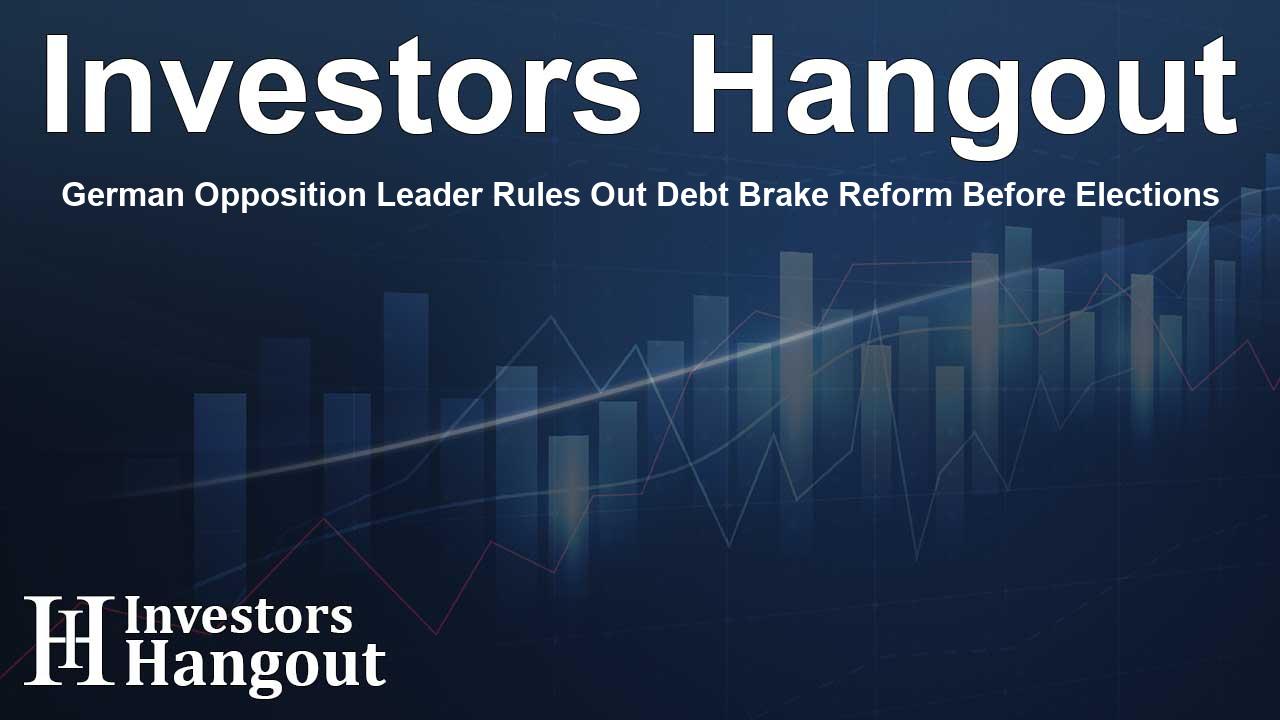German Opposition Leader Rules Out Debt Brake Reform Before Elections

Concerns Over Debt Brake Reform in Germany
Germany's political landscape is witnessing a significant moment as Friedrich Merz, the leader of the conservative opposition, lays down a firm stance on the prospect of altering the debt brake before the upcoming elections scheduled for February. This topic has garnered increasing attention as it could greatly influence the nation’s fiscal policy.
Understanding the Debt Brake
The debt brake is a critical element of German fiscal policy, introduced to limit the public deficit to a mere 0.35% of the gross domestic product. This restriction ensures that public spending remains sustainable, allowing Germany to maintain its strong economic foundations. However, any changes to these regulations require a robust consensus, necessitating a two-thirds majority in both houses of parliament.
Friedrich Merz's Position
Merz, speaking on Deutschlandfunk radio, decisively ruled out any reforms to the debt brake before the elections. He emphasized, “I can definitely rule that out,” reflecting a solid commitment to fiscal discipline. His comments underline a clear differentiation from other viewpoints that may seek immediate fiscal expansion.
Post-Election Discussions
Looking beyond the elections, Merz expressed a cautious openness about discussing possible reforms. He acknowledged the need for a dialogue on the debt brake's future but stressed that any discussions should not focus solely on increasing expenditures. “We can discuss the debt brake, but not if it involves simply increasing spending,” he articulated. This highlights his concern for the wider implications of unilateral spending increases.
The Need for Reform
Reforming state spending is a priority for Merz before any alterations to the debt brake can be considered. He indicated that the current economic landscape demands thorough scrutiny and potential restructuring of how the government allocates its budget. He was cautious, stating he is “very, very sceptical” about whether this approach is indeed the best way to handle increasing debt levels.
A Shift in Views
Merz had previously shown reticence towards modifying the debt brake, urging the country to adhere to this fiscal policy. However, his recent comments suggest a nuanced shift, where he acknowledges the importance of flexibility in governance while still advocating for prudence in public finance. Such a shift may resonate with various stakeholders concerned about Germany’s fiscal health and long-term economic stability.
Conclusion
The conversation surrounding the debt brake reform in Germany is emblematic of broader fiscal challenges that nations face as they navigate economic recovery and growth. Friedrich Merz's firm stance reflects the complexities of political decision-making in times of uncertainty. As the elections approach, how this issue develops will certainly be an important factor influencing German economic and political policy.
Frequently Asked Questions
What is the debt brake in Germany?
The debt brake is a fiscal policy instrument that limits the federal public deficit to 0.35% of the GDP, ensuring sustainable public spending.
Who is Friedrich Merz?
Friedrich Merz is the leader of the Christian Democratic Union (CDU) and a prominent figure in German politics, potentially positioning himself as the next chancellor.
What are the implications of changing the debt brake?
Changing the debt brake could lead to increased public spending, which may exacerbate fiscal imbalances if not handled prudently.
How does reforming state spending relate to the debt brake?
Reforming state spending is seen as a prerequisite for any changes to the debt brake to ensure responsible fiscal management before potentially increasing debt.
When is the next election in Germany?
The next elections in Germany are scheduled for February, where various pivotal issues, including fiscal policy, will be debated.
About Investors Hangout
Investors Hangout is a leading online stock forum for financial discussion and learning, offering a wide range of free tools and resources. It draws in traders of all levels, who exchange market knowledge, investigate trading tactics, and keep an eye on industry developments in real time. Featuring financial articles, stock message boards, quotes, charts, company profiles, and live news updates. Through cooperative learning and a wealth of informational resources, it helps users from novices creating their first portfolios to experts honing their techniques. Join Investors Hangout today: https://investorshangout.com/
Disclaimer: The content of this article is solely for general informational purposes only; it does not represent legal, financial, or investment advice. Investors Hangout does not offer financial advice; the author is not a licensed financial advisor. Consult a qualified advisor before making any financial or investment decisions based on this article. The author's interpretation of publicly available data shapes the opinions presented here; as a result, they should not be taken as advice to purchase, sell, or hold any securities mentioned or any other investments. The author does not guarantee the accuracy, completeness, or timeliness of any material, providing it "as is." Information and market conditions may change; past performance is not indicative of future outcomes. If any of the material offered here is inaccurate, please contact us for corrections.